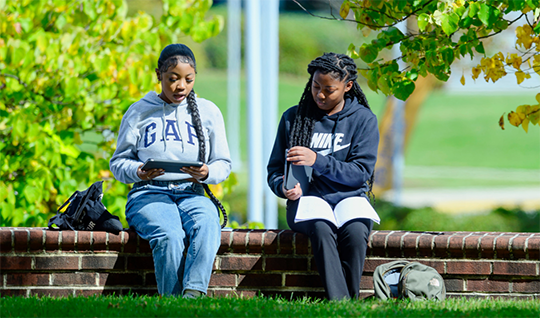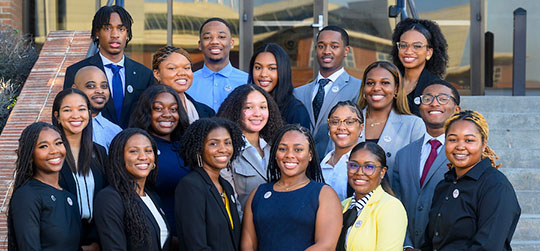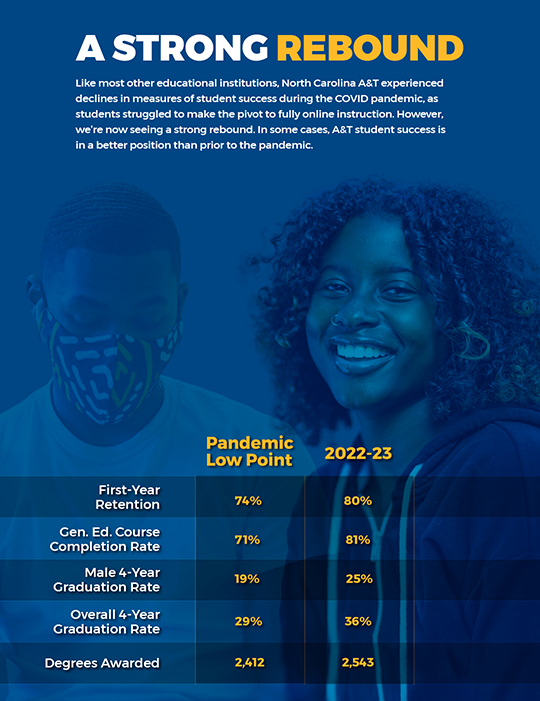
One of North Carolina A&T’s sharpest points of academic focus over the past eight years has been a wide-ranging collection of initiatives and metrics summarized under the heading of “student success.” They can be as disparate as creating living-learning residence halls or measuring undergraduate degree efficiency, but as those who work in this area know, the fabric of student success is made of many diverse threads woven into a strong, supportive environment.
That focus led to significant progress in enrollment, retention and graduation rates. But the COVID pandemic and the unprecedented pressures it put on in-person instruction, online education and, for many, medical needs interrupted that trendline from 2020-22.
The good news today is that we are seeing a strong comeback in student success measures across academic programs. In several important instances, we are not only seeing a solid uptick, but outcomes that surpass pre-COVID success.
Retention of first-year students, for instance, has jumped from 74% during the worst days of the pandemic now to 80%. The completion rate for courses in our general education curriculum increased by 10%, from 71% to 81%. The four-year graduation rate is up for all students, but perhaps most notably, more than 6% for male students, who continue to trail their female peers in virtually all measures throughout academia.
A&T’s success in these areas is not the result of any single effort, but of numerous strategies that, taken together, surpass the sum of the individual parts. One that bears mentioning here is the quality enhancement plan or QEP we put in place as part of the university’s accreditation affirmation in 2021.
QEP: Toward Enhanced Achievement in Mathematics recognizes that general education math courses represent the single greatest academic challenge facing our undergrads. It has created a network of free in-person and online math tutoring plus a range of testing and continuous instructional support through the web-based ALEKS PPL program. Students are taking advantage of those supports, and their performance is showing up in improved measures across multiple categories.
Earlier this fall, A&T also opened a new University Student Success Office that is bringing together the growing portfolio of success initiatives under a holistic, service-oriented banner. The USSO not only includes specific academic performance programs, but recognizes the significance of mental and emotional health in individual success. It also incorporates development programming designed to help students prepare for the professional lives.
North Carolina A&T’s new strategic plan, approved earlier this year, sets ambitious new goals for student success. Through the thoughtful, creative efforts described above, we are working not only to reach but exceed them.
- Chancellor Harold L. Martin Sr.
 Student performance in mathematics coursework is helping to fuel student success in multiple areas. Student performance in mathematics coursework is helping to fuel student success in multiple areas.
|



 + Read more at https://www.ncat.edu/news/2023/10/dctc-inaugural-cohort.php.
+ Read more at https://www.ncat.edu/news/2023/10/dctc-inaugural-cohort.php.

 +Read more about the center at https://www.ncat.edu/news/2023/09/doe-funds-climate-resiliency-center.php
+Read more about the center at https://www.ncat.edu/news/2023/09/doe-funds-climate-resiliency-center.php





 Student performance in mathematics coursework is helping to fuel student success in multiple areas.
Student performance in mathematics coursework is helping to fuel student success in multiple areas. Inaugural members of the A&T cohort of the Defense Civilian Training Corps Scholars Program
Inaugural members of the A&T cohort of the Defense Civilian Training Corps Scholars Program
 The new center will focus on climate impacts on vulnerable communities in North Carolina’s Piedmont Triad region.
The new center will focus on climate impacts on vulnerable communities in North Carolina’s Piedmont Triad region.
